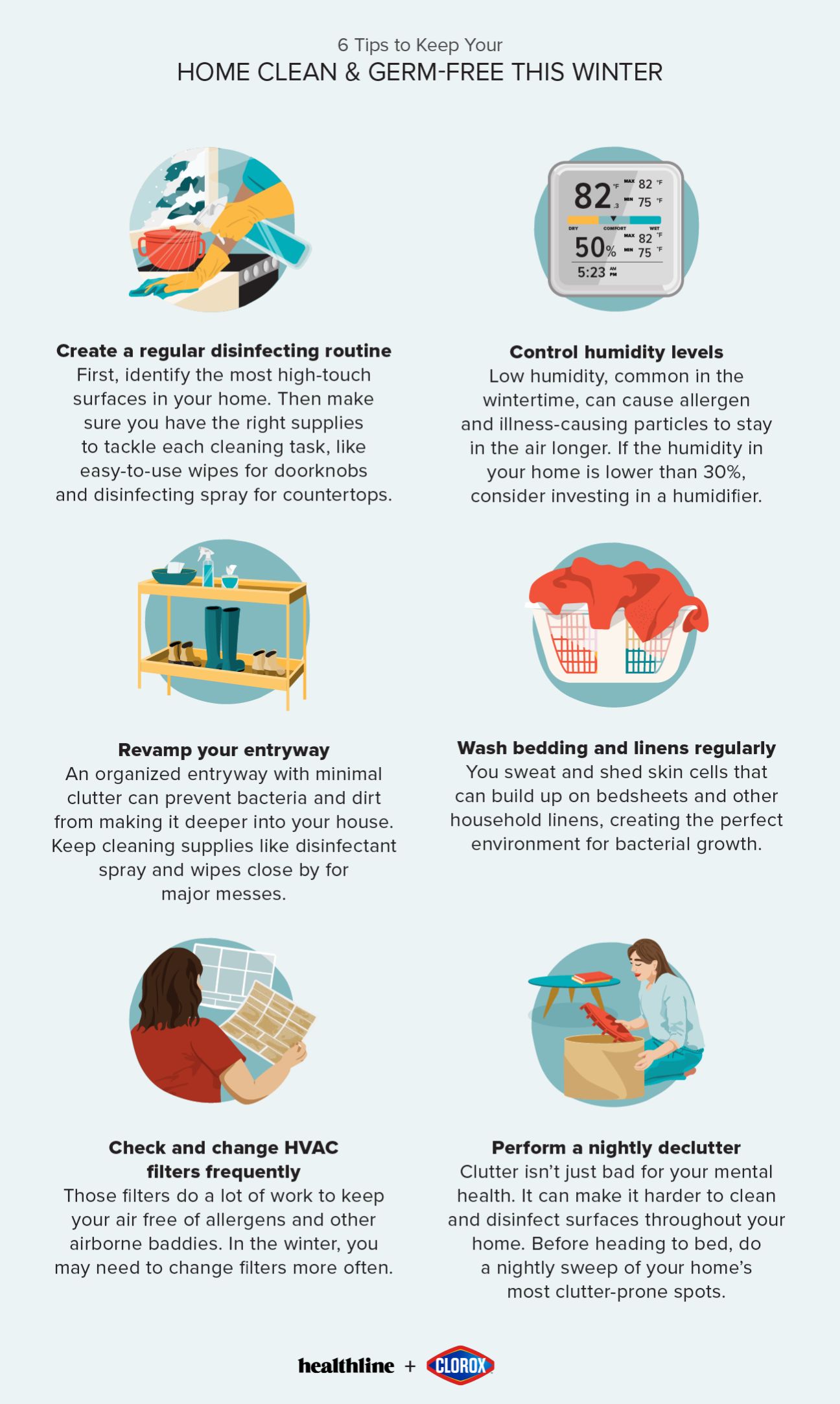"Cold Weather, Hotbed for Winter Germs: Navigating Health in Chilly Climates"
WINTER ENVIRONMENTAL GERMS More indoor activity and dry indoor air can mean a higher likelihood of getting sick during the winter. Keep germs at bay with these helpful winter cleaning tips.
You may not automatically think of cold and flu season when you think of cold weather. But some illness-causing viruses survive better in cool, dry conditions common in the fall and winter.
We’ve partnered with
Clorox® to bring you this infographic and accompanying article with tips on keeping your home clean and germ-free all winter.
 Share on Pinterest
Share on PinterestCreate a disinfecting routine
First, let’s break down the difference between cleaning, sanitizing, and disinfecting. According to the
Centers for Disease Control and Prevention (CDC):Cleaning: This process involves scrubbing a surface with water and soap. It can help remove most, but not all, germs and dirt from a surface.
Sanitizing: This process involves using diluted bleach or sanitizing sprays to reduce the germs on a surface. Cleaning a surface before sanitizing it is important.
Disinfecting: This process involves the use of stronger bleach solutions or chemicals. It can help clear most germs on a surface or object. Cleaning a surface before disinfecting it is a good idea.
Before you start sanitizing and disinfecting, it’s a good idea to identify your home’s most high touch surfaces, like doorknobs, light switches, countertops, and appliance handles. Clean these surfaces most often. Also, regularly wipe down visibly dirty surfaces, like countertops.
Take extra care to sanitize or disinfect if someone in your household feels sick or has been in close physical contact with someone feeling sick.
Keeping a list in your head of surfaces to clean can feel overwhelming. Create a paper or digital checklist of daily and weekly cleaning tasks, which can help offload some of the overwhelm.
Manage humidity levels
Did you know the humidity level in your home can affect your risk of getting sick with a viral illness?
A 2021 study suggested that moderate humidity levels
between 40 and 60% may reduce the risk of viral transmission and make some viruses less likely to survive in the air.
Plus, dry indoor conditions can make you more likely to experience allergies.
Many home thermostats can detect and display indoor humidity levels. If your home’s humidity drops under
30%, consider investing in a humidifier and taking extra precautions as cold and flu season arrives, which can include more frequent handwashing and disinfecting surfaces.
Wash bedding and linens regularly
You regularly shed sweat and skin cells, whether you go about your day or drift off to dreamland. All that grime can build up on soft surfaces around your home, including bedsheets, pillows, and blankets.
Aim to change and wash your sheets weekly to
prevent the buildup of bacteria-causing dirt and grime.
Regularly laundering bed clothes can also help minimize allergy symptoms by targeting allergens and dust mites hidden in your sheets.
Here are a few tips to maximize your efforts:Use hot water when washing sheets and bedding.
Get a second or third set of sheets to make swapping them out easier.
Depending on care instructions, use a high heat dryer setting to dry your sheets or iron them after air drying.
Revamp your entryway
At the end of a long day, the last thing you can think about is tracking dirt and germs into your home.
A tidy, organized entryway with minimal clutter may help prevent germs from entering your home.
Here are a few tips for maintaining a clean and decluttered entryway:Take off your shoes as soon as you enter your home.
Create a designated spot for outdoor footwear, like a boot tray or shoe rack.
Use a basket or another receptacle to collect items that don’t belong in the entryway. Then, regularly empty it.
Install a light fixture to ensure proper entryway lighting, making spotting dirty surfaces easier.
Organize cleaning supplies, like disinfectant spray and wipes, especially for your entryway, and keep them nearby on a shelf or in a basket.
Check and change HVAC filters frequently
If you have a heating, ventilation, and air conditioning (HVAC) system, it’s important to regularly change the filters to keep your home’s air clean. Here are some guidelines based on recommendations from the company
Service Experts Heating & Air Conditioning:Change 1-inch thick filters every 30–60 days.
Change 2-inch thick filters every 3 months.
Change 4-inch thick filters every 6 months.
Thicker filters tend to last longer and
trap more allergens and illness-causing particles.
Some smart thermostats take the guesswork out of filter maintenance and can remind you to change your filter based on your usage.
Don’t have an HVAC system? Consider investing in an air purifier to help with indoor air quality.
Perform a nightly declutter
For some people, going to bed in a messy house may cause anxiety and high stress levels in the morning.
Waking up to a tidy kitchen, living room, or bathroom can help remove some of that stress you might feel when you wake up.
A nightly declutter doesn’t have to be an overwhelming, time-suck of a task. Even a minimal cleanup can help provide peace of mind as you prepare for bed. Plus, removing clutter can make it easier to clean and disinfect your home’s surfaces.
Before heading to bed, put away loose items in clutter-prone spots, like countertops, entryways, and bathroom sinks.
If putting everything in its rightful place sounds time consuming, collect everything in a basket and start by putting away just one or two items before going to sleep.
Bottom line
If cleaning and keeping your space tidy seems challenging, know that it doesn’t have to take up all your free time.
A bit of prep and the right tools can help you get your indoor environment clean and germ-free, minimize germ transmission, and stay healthy for the holidays.
CONCLUSION
During the winter season, various environmental factors can contribute to the spread of germs. The cold weather often leads people to spend more time indoors in close proximity, which can facilitate the transmission of viruses and bacteria. Additionally, indoor heating systems can dry out the air, potentially causing irritation to the respiratory system and making individuals more susceptible to infections.
Furthermore, in colder climates, snow and ice can accumulate outdoors, providing a breeding ground for certain bacteria and viruses. As people come into contact with these surfaces or share confined spaces like public transportation, the likelihood of spreading germs increases.
Practicing good hygiene, such as regularly washing hands with soap and water, using hand sanitizer, and covering one's mouth and nose when sneezing or coughing, can help mitigate the spread of germs during the winter months. Additionally, maintaining a clean living and working environment by regularly disinfecting surfaces can also aid in reducing the transmission of illnesses.


